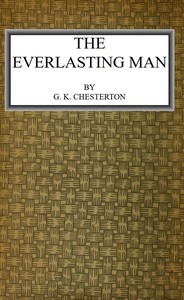The Everlasting Man by G. K. Chesterton
"The Everlasting Man" by G. K. Chesterton is a philosophical work written in the early 20th century. This text serves as a historical analysis rather than a theological discourse, addressing the unique nature of humanity in comparison to other religions and myths throughout time. Chesterton argues against the notion that Christ and Christianity merely coexist alongside other myths, presenting instead a distinct view of human existence that emphasizes a divine aspect to
human evolution. The opening of the book sets the stage for Chesterton’s exploration of humanity's origins and the vital differences that separate man from other creatures. He introduces the concept of "the cave-man" and critiques popular portrayals of prehistoric men as brutish and simplistic. Rather, he highlights evidence of artistic expression and intelligence among early humans, suggesting that their creations signify the unique quality of man as a creator. Through playful examples and philosophical musings, Chesterton aims to shift the reader’s perspective back to the wonder of existence, emphasizing the profound mystery and nobility of the human soul as reflected in historical narratives. (This is an automatically generated summary.)
Read or download for free
| How to read | Url | Size | |||
|---|---|---|---|---|---|
| Read now! | https://www.gutenberg.org/ebooks/65688.html.images | 641 kB | |||
| EPUB3 (E-readers incl. Send-to-Kindle) | https://www.gutenberg.org/ebooks/65688.epub3.images | 489 kB | |||
| EPUB (older E-readers) | https://www.gutenberg.org/ebooks/65688.epub.images | 495 kB | |||
| EPUB (no images, older E-readers) | https://www.gutenberg.org/ebooks/65688.epub.noimages | 316 kB | |||
| Kindle | https://www.gutenberg.org/ebooks/65688.kf8.images | 658 kB | |||
| older Kindles | https://www.gutenberg.org/ebooks/65688.kindle.images | 612 kB | |||
| Plain Text UTF-8 | https://www.gutenberg.org/ebooks/65688.txt.utf-8 | 610 kB | |||
| Download HTML (zip) | https://www.gutenberg.org/cache/epub/65688/pg65688-h.zip | 469 kB | |||
| There may be more files related to this item. | |||||
Similar Books
About this eBook
| Author | Chesterton, G. K. (Gilbert Keith), 1874-1936 |
|---|---|
| Title | The Everlasting Man |
| Note | Wikipedia page about this book: https://en.wikipedia.org/wiki/The_Everlasting_Man |
| Credits | Tim Lindell, Chuck Greif and the Online Distributed Proofreading Team at https://www.pgdp.net |
| Reading Level | Reading ease score: 62.7 (8th & 9th grade). Neither easy nor difficult to read. |
| Language | English |
| LoC Class | BL: Philosophy, Psychology, Religion: Religion: General, Miscellaneous and Atheism |
| Subject | Religion |
| Subject | Christianity and other religions |
| Subject | Catholic Church -- Apologetic works |
| Category | Text |
| EBook-No. | 65688 |
| Release Date | Jun 24, 2021 |
| Most Recently Updated | Oct 18, 2024 |
| Copyright Status | Public domain in the USA. |
| Downloads | 1061 downloads in the last 30 days. |
| Project Gutenberg eBooks are always free! | |

